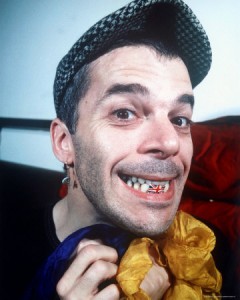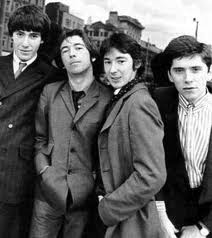We know that punk didn’t start with Ramones or The Sex Pistols, although they spring to mind first when the genre is mentioned. The U.S. has protopunks like The MC5 and The Stooges, as well as the bands that toed the line between subgenres like New York Dolls. Punk? Glam? Depends on the daylight, I suppose. On the other side, early Kinks records certainly had an influence on the culture, even if Ray Davies’ later pop tunes flirted hard with a certain posh courtliness that drew ire from the mid-’70s subset. The Who danced on a very fine line between being punks and being mods, with the release of Tommy being a breaking point for them. (Now they were mod/trad…still with me here?) Something else that the English variant had that Americans might have lacked, beside a more justified sense of outrage, was a better vocabulary. Listening to some of those bands that were on Stiff Records, one could get the sense that they had perhaps a more sophisticated palette from which to work with, although they often did their best to never let on. Ian Dury & The Blockheads were alternately clever and crude, but the wordplay and points-of-reference Dury regularly employed spoke to something else entirely. You had to suspect they weren’t being shut out because of incapability, but because they were broke.
Blockheads – Ian Dury & The Blockheads
 American punk was gut-level. It was a form of primitivism — nothing too arty. If you were too arty you were shunted into the subcategory of “New Wave” (before it became synonymous with synthesizer pop). Television, while often being just as abrasive as punk, specifically targeting Tom Verlaine’s vocals, were also consummate performers thanks to Verlaine and Richard Lloyd’s immaculate guitar tangents. It’s important to remember that an offshoot of Television was Richard Hell and The Voidoids, further tying them into the scene if not fully integrating them.
American punk was gut-level. It was a form of primitivism — nothing too arty. If you were too arty you were shunted into the subcategory of “New Wave” (before it became synonymous with synthesizer pop). Television, while often being just as abrasive as punk, specifically targeting Tom Verlaine’s vocals, were also consummate performers thanks to Verlaine and Richard Lloyd’s immaculate guitar tangents. It’s important to remember that an offshoot of Television was Richard Hell and The Voidoids, further tying them into the scene if not fully integrating them.
Blank Generation – Richard Hell & The Voidoids
Talking Heads sang of a “Psycho Killer,” for Christ’s sake, but was formed by a clutch of art school students. Dayton Ohio’s Devo was the band that turned new wave into synth pop, but initially was as angry and punk as anyone could plainly hear. Their specific anger, however, had a justified foundation. The group’s central theme of humanity’s de-evolution directly stemmed from co-founder Jerry Casale’s experience in college, Kent State, and the infamous massacre. Crosby Stills Nash & Young might have decried the event in the song “Ohio,” but Devo was shaped and deformed in the truest sense of it through direct experience. New York’s Suicide, Alan Vega and Martin Rev, are plainly punk but because of the synth being their instrument of choice, they were instead New Wave. Some of these distinctions make no sense whatsoever.
Mongoloid – Devo
The British side seemed to be more inclusive, maybe more forgiving. In retrospect we can say that the punk aesthetic was just one of many styles that Elvis Costello, Joe Jackson, and others adopted. Costello is clearly identified over time as a guy with a varied sense of influences, and yet a track like the bracing “No Action,” the opener for This Year’s Model, is clearly punk-infused. Jackson understood the sort of alienation that the punks knew, but he also reached deep into jazz and classical forms. After all, his primary instrument is the piano and that does not readily lend itself to the sturm und drang of angry outburst in the same way the electric guitar does. And so “Is She Really Going Out With Him?” might chafe a hardcore fan of the time, but “Got The Time” and “I Don’t Wanna Be Like That” absolutely coincide.
I Don’t Wanna Be Like That – Joe Jackson
 These are the most prominent examples, but you also have bands like The Vibrators which never hits those specific heights, yet are distinctly a pop band. “Baby Baby” is a good illustration of this, coming from the album Pure Mania. And if you are really pushing that envelope, the Buzzcocks’ “What Do I Get” and “Ever Fallen In Love” provide more proof. The point is, in the U.K. there was a much more fluid sense of what this whole thing was about, and artists could conceivably break through without too much alteration.
These are the most prominent examples, but you also have bands like The Vibrators which never hits those specific heights, yet are distinctly a pop band. “Baby Baby” is a good illustration of this, coming from the album Pure Mania. And if you are really pushing that envelope, the Buzzcocks’ “What Do I Get” and “Ever Fallen In Love” provide more proof. The point is, in the U.K. there was a much more fluid sense of what this whole thing was about, and artists could conceivably break through without too much alteration.
Ever Fallen In Love – The Buzzcocks
Whereas, Ramones flirted with a Southern Rock vibe on Road To Ruin‘s “Questioningly” and also covered the British Invasion staple “Needles And Pins.” Neither track catapulted the band to Top 10 status. Blondie toned things down a bit and in 1978 achieved crossover success with the Parallel Lines album. As if to firmly set themselves just that farther away from the New Wave suburb, the album contained a famous cover of The Nerves’ “Hanging On The Telephone,” the edgy “One Way Or Another,” and the oh-my-god-it’s-a-disco-song “Heart Of Glass.” They also employed one of the era’s most savvy pop producers, Mike Chapman, so this graduation to bigger things could hardly be categorized as serendipity.
Baby Baby – The Vibrators





Comments